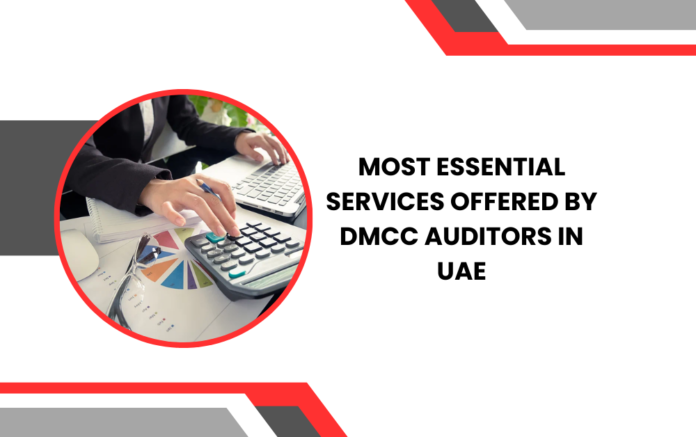Introduction to DMCC Auditors
The DMCC is a leading free zone in Dubai, known for its robust business environment and diverse range of industries. Companies operating within the DMCC are required to adhere to stringent regulatory standards, making the role of auditors crucial. DMCC Approved Auditors bring a wealth of expertise and a deep understanding of local and international regulations, providing services that are essential for maintaining financial integrity and compliance. These services not only help businesses meet legal requirements but also enhance their operational efficiency and financial performance.
The business hub of the UAE, particularly within the Dubai Multi Commodities Centre (DMCC), the role of auditors is indispensable. DMCC auditors provide a wide array of services designed to ensure financial accuracy, compliance with regulations, and overall business efficiency. This article explores the various types of services offered by DMCC auditors, shedding light on their importance and how they address the critical needs of businesses operating in this dynamic environment.
Financial Statement Audits
Financial statement audits are one of the primary services offered by DMCC auditors. These audits involve a thorough examination of a company’s financial statements, including the balance sheet, income statement, and cash flow statement. The goal is to provide an independent and objective opinion on whether the financial statements are presented fairly and in accordance with generally accepted accounting principles (GAAP) or international financial reporting standards (IFRS). DMCC auditors meticulously review financial records, test internal controls, and gather evidence to support their opinion. This process ensures the accuracy and reliability of financial statements, which is crucial for stakeholders such as investors, creditors, and regulators. Accurate financial statements are essential for making informed business decisions and maintaining stakeholder confidence.
Compliance Audits
Compliance audits are another vital service provided by DMCC auditors. These audits focus on ensuring that a company adheres to relevant laws, regulations, and internal policies. This is particularly important for businesses operating in highly regulated sectors within the DMCC, such as commodities trading, finance, and healthcare. DMCC auditors evaluate the company’s compliance with various regulatory requirements, including anti-money laundering (AML) regulations, data protection laws, and industry-specific standards. They review policies and procedures, test controls, and assess the effectiveness of compliance programs. By identifying areas of non-compliance, auditors help businesses avoid legal penalties, reputational damage, and operational disruptions. Compliance audits provide valuable insights into improving compliance practices and mitigating regulatory risks.
Internal Audits
Internal audits are essential for evaluating and improving the effectiveness of a company’s internal controls, risk management, and governance processes. Unlike external audits, which are conducted by independent firms, internal audits are typically performed by the company’s own auditing department or outsourced to an external firm. DMCC auditors conduct internal audits to assess the adequacy of internal controls, identify potential risks, and recommend improvements. They examine financial and operational processes, evaluate the efficiency of resource utilization, and ensure compliance with internal policies and procedures. Internal audits provide management with valuable insights into areas that require attention and help enhance the overall efficiency and effectiveness of the organization.
Operational Audits
Operational audits focus on evaluating the efficiency and effectiveness of a company’s operations. These audits go beyond financial records to assess various aspects of the business, including production processes, supply chain management, and information technology systems. DMCC auditors analyze key performance indicators, benchmark against industry standards, and identify opportunities for improvement. The goal of an operational audit is to optimize processes, reduce costs, and enhance productivity. By providing actionable recommendations, auditors help businesses streamline operations, improve performance, and achieve strategic objectives. Operational audits are particularly beneficial for businesses looking to gain a competitive edge and enhance their operational efficiency.
Information Technology (IT) Audits
In today’s digital age, information technology is at the heart of business operations. IT audits are designed to evaluate the effectiveness of a company’s IT infrastructure, data security measures, and disaster recovery plans. DMCC auditors assess the adequacy of access controls, system configurations, and cybersecurity protocols. They review IT policies and procedures, test controls, and identify vulnerabilities that could compromise the security and integrity of the company’s data. IT audits help businesses safeguard their digital assets, protect sensitive information, and ensure business continuity. By addressing IT-related risks, auditors enable businesses to operate securely and efficiently in an increasingly digital world. IT audits are essential for maintaining the integrity and security of information systems.
Forensic Audits
Forensic audits are specialized investigations conducted to detect and prevent fraud and other financial misconduct. DMCC auditors use a combination of forensic accounting techniques, data analytics, and investigative skills to uncover fraudulent activities. They analyze financial records, interview employees, and examine transaction patterns to identify irregularities. Forensic audits are often initiated in response to suspected fraud, but they can also be proactive measures to prevent future incidents. By uncovering fraudulent activities early on, forensic audits help businesses take corrective actions, recover losses, and implement stronger anti-fraud measures. These audits provide valuable insights into improving internal controls and enhancing the overall integrity of financial operations.

Due Diligence Audits
Due diligence audits are conducted in the context of mergers, acquisitions, and other significant business transactions. These audits involve a thorough evaluation of the target company’s financial health, operational performance, and potential risks. DMCC auditors analyze financial statements, review internal controls, and assess the effectiveness of management practices. They also evaluate the target company’s compliance with regulatory requirements and identify any legal or financial liabilities. Due diligence audits provide valuable information that helps buyers make informed decisions, negotiate favorable terms, and mitigate risks associated with the transaction. These audits play a crucial role in ensuring the success and sustainability of mergers and acquisitions.
Environmental Audits
Environmental audits are designed to evaluate a company’s environmental practices and compliance with environmental regulations. DMCC auditors assess the company’s environmental impact, including waste management, energy consumption, and carbon footprint. They review policies and procedures, test controls, and identify opportunities for improvement. Environmental audits help businesses minimize their environmental impact, comply with regulatory requirements, and demonstrate their commitment to sustainability. By providing independent verification of environmental practices, auditors help businesses gain the trust of stakeholders and enhance their reputation. These audits also provide valuable insights into improving sustainability practices and achieving long-term environmental goals.
Social and Ethical Audits
Social and ethical audits focus on evaluating a company’s social responsibility and ethical practices. These audits assess the company’s impact on stakeholders, including employees, customers, suppliers, and the community. DMCC auditors review policies and procedures, test controls, and evaluate the effectiveness of social and ethical programs. They assess compliance with labor laws, human rights standards, and ethical guidelines. Social and ethical audits help businesses identify areas for improvement, enhance their social responsibility practices, and demonstrate their commitment to ethical behavior. By providing independent verification of social and ethical practices, auditors help businesses build trust with stakeholders and enhance their reputation.
Tax Audits
Tax audits involve a comprehensive review of a company’s tax filings and compliance with tax laws and regulations. DMCC auditors assess the accuracy and completeness of tax returns, review supporting documentation, and test internal controls. They also evaluate the company’s compliance with tax laws, including deductions, credits, and exemptions. Tax audits help businesses identify potential issues, mitigate risks, and avoid legal penalties. By ensuring accurate and compliant tax filings, auditors provide businesses with peace of mind and financial security. These audits also provide valuable insights into improving tax practices and optimizing tax strategies.
Conclusion
In conclusion, DMCC auditors offer a wide range of essential services that are crucial for maintaining financial integrity, compliance, and operational efficiency. Financial statement audits ensure the accuracy and reliability of financial statements, while compliance audits help businesses adhere to relevant laws and regulations. Internal audits evaluate and improve internal controls, risk management, and governance processes. Operational audits optimize business processes, and IT audits safeguard digital assets. Forensic audits detect and prevent fraud, while due diligence audits support mergers and acquisitions. Environmental, social, and ethical audits enhance sustainability and social responsibility practices. Finally, tax audits ensure accurate and compliant tax filings. By providing these essential services, DMCC auditors help businesses achieve their goals, mitigate risks, and build trust with stakeholders. As the business landscape continues to evolve, the role of DMCC auditors will remain critical in ensuring the success and sustainability of businesses in a complex and dynamic environment.
Note :- To Read More Articles Visit on- getmeta

